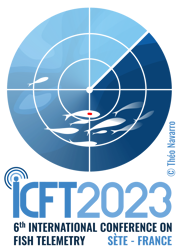Sponsoring
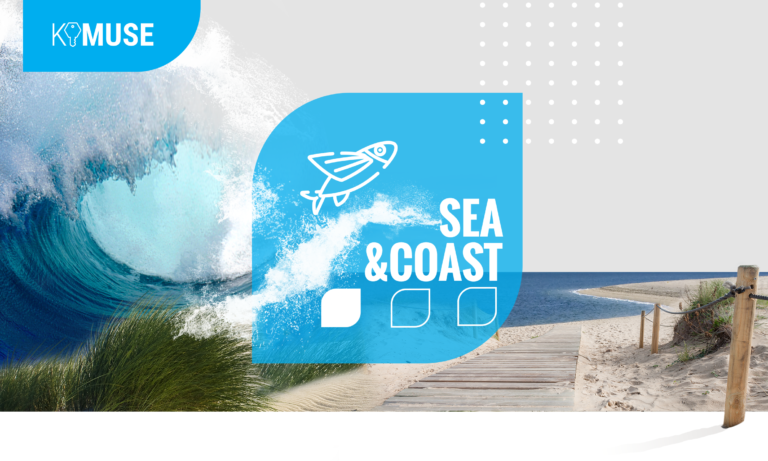
|
KIM SEA & COAST |
| The Key Initiative of MUSE (KIM) named ‘Sea & Coast’ aims at promoting and supporting these knowledges and skills at regional, national and international levels. The targeted audience includes scientists, companies, institutions, organisations, local authorities, as well as the general public. The KIM Sea & Coast’s goals are notably pursued through training activities (international multidisciplinary summer school), incentives for international collaborative research (annual calls for international projects from MUSE scientists in partnership with universities around the world), incentives for collaborative research with companies or institutions (master challenges) and scientific conferences for the general public (in partnership with the Planet Ocean Montpellier aquarium) or for companies (in partnership with the Pôle Mer Méditerranée competitiveness cluster). | |
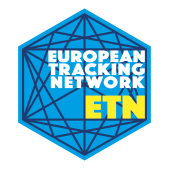
|
ETN |
| Our mission is to track aquatic animals across Europe to better understand, protect and manage them. With this COST Action, we want to close this gap and the overarching objective is to ensure a transition from a loosely-coordinated set of existing regional telemetry initiatives to a sustainable, efficient, and integrated pan-European biotelemetry network embedded in the international context of already existing initiatives. This will be achieved through working group meetings, workshops, training courses and scientific missions. Our mission is focused on: - implementing a centralised European database, requirements and policy mapped to the data standards of existing international biotelemetry data systems, - improve the usefulness and inter-applicability of currently available technology and foster technological advancements, - promoting the establishment of key telemetry infrastructure and research on key species, and - provide continuous training opportunities and disseminate knowledge to the stakeholders' community. | |
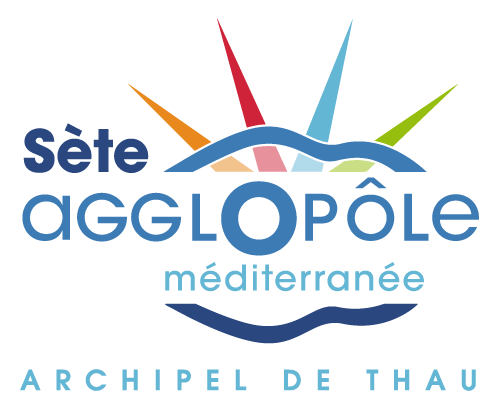
|
SETE AGGLOPOLE MEDITERRANNEE |
| Sète agglopôle méditerranée is a rural conglomerate composed of 14 municipalities around the Thau lagoon and the town of Sète. It is the second largest community in the Hérault region after Montpellier and has 128,000 inhabitants. The aims of such a grouping are very concrete: to provide the inhabitants of the territory numerous public services, to build facilities and to conduct development projects. Sète agglopôle méditerranée represents an exceptional natural environment, whose richness has favored the economic development of the territory: fishing, shellfish farming, thermalism. In order to become the territory of the blue economy of Occitania, the Agglopôle ensures the preservation and the management of these exceptional spaces. Through an ambitious public policy, Sète agglopôle méditerranée is developing several projects for the next 20 years, including the creation of a marine campus with an international vocation, specializing in marine biodiversity, fishing, renewable energies, sustainable urban planning and the development of the circular economy and green growth. | |

|
VILLE DE SETE |
| The city of Sète offers a wealth of cultural activities and many remarkable heritage sites to discover. The city of Sète has become an essential stop in the south of France for festival-goers, tourists and visitors. It also offers a unique living environment for its inhabitants. The region of Sète also has many natural resources. In the hinterland, the vineyards are numerous. Oysters and mussels are also among the main natural resources of the region. Their production is mainly centered on the Etang de Thau, where nearly 600 producers are gathered. Sète is the leading French fishing port in the Mediterranean in terms of tonnage, value and number of vessels. On a national scale, it is the tenth port in tonnage and the twelfth in value. In addition to artisanal fishing and trawling, specializing either in demersal (hake, octopus, bass, sea bream, sole, squid ...) or in pelagic fish (sardines and anchovies), the fishing port is known as the most important center of tuna fishing by seine. The tuna purse seine fleet, which was created in 1970, has undergone significant technical developments over the last 10 years: construction of new vessels with increased lengths, modernization of fish detection equipment, and diversification of the fishing grounds. Today, the regulations impose very strict quotas and strongly limit the fishing season in the Mediterranean (a few weeks between April and mid-June). | |
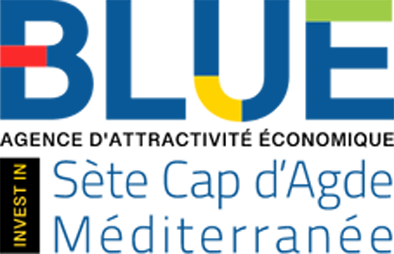
|
INVESTINBLUE |
| Sète Agglopole Méditerranée and Hérault Méditerranée formalized their rapprochement in terms of economic development with the creation of a joint attraction agency, "BLUE - Invest in Sète Cap d'Agde Méditerranée", in partnership with the Occitanie / Pyrenees Méditerranée Region and the Hérault CCI. Its objectives are to promote the new economic destination "Sète Cap d'Agde Méditerranée", born of the meeting of the two territories, to attract new companies and create jobs in sectors of the future and innovative (blue economy, circular economy, audiovisual, digital, food, sport health or art of living). | |
|
|
INNOVASEA |
| With 250 employees worldwide, Innovasea provides full end-to-end solutions for fish farming and aquatic species research – including quality equipment, expert consulting services, and innovative platforms and products that deliver unrivaled data, information and insights.From land to open ocean, Innovasea provides aquatic solutions that hold up in the most challenging conditions. And stand up for life.This requires more than just delivering the world’s most advanced aquatic technologies. It means continuously applying knowledge in science and engineering, fish tracking and farm operations to develop the ideal systems for each site. It means working shoulder-to-shoulder with customers to cultivate and protect fish populations. And it means consciously designing products and services to give back more to nature than we take. Day in and day out, we are driven by a commitment to make our ocean and freshwater ecosystems sustainable for future generations. | |

|
IRD (Institut de Recherche pour le Développement) |
| IRD is a French public research establishment operating under the joint authority of the French Ministry for Higher Education, and Research and the French Ministry for Europe and Foreign Affairs. It takes an original approach to research, expertise, training and knowledge-sharing for the benefit of countries and regions, making science and innovation key drivers in their development. IRD sets its priorities in line with the Sustainable Development Goals adopted by the United Nations in September 2015, to steer development policies. IRD seeks to tackle the challenges facing us today: global, environmental, economic, social and cultural changes that affect the whole planet. | |
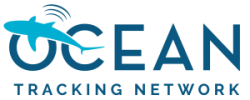
|
OTN |
| OTN is a global aquatic animal tracking, technology, data management and partnership platform headquartered at Dalhousie University in Canada. OTN’s vision is to revolutionize the understanding and stewardship of aquatic species globally through collaborative leveraging of Canadian and international expertise, data warehousing and technological innovation. OTN’s mission is to inform the sustainable management and stewardship of aquatic animals by providing knowledge on their movements, habitats and survival in the face of changing global environments. OTN and its partners are using electronic tags to track more than 200 keystone, commercially important, and endangered species worldwide. OTN is deploying Canadian-made acoustic receivers and oceanographic monitoring equipment in all of the world’s five oceans. This global receiver infrastructure comprehensively examines the local-to-global movements of tagged marine animals such as sharks, sturgeon, eels, and tuna, as well as other marine species including squid, sea turtles, and marine mammals. | |

|
WILDLIFE COMPUTERS |
| Wildlife Computers is the leading provider of advanced wildlife telemetry solutions. Their consultation team—which includes on-staff biologists—works to understand your project goals including what data the scientists need, what animal they are researching, environment, and more. The team uses knowledge gathered over the last 30 years on best practices, techniques, and procedures to make recommendations for getting the data scientists need to meet their objectives. Data from their tags appears in more than 2,300 peer-reviewed publications and plays a key role in many management decisions, policy changes, outreach and education initiatives worldwide. | |
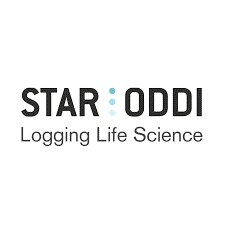
|
STAR-ODDI |
| Star-Oddi was founded in Iceland in 1985. From the start they have been a leading developer and manufacturer of small sensors, data loggers and technology for environmental and life sciences. Star-Oddi have over 30 years of experience in making small, performing loggers for four main markets: underwater environments and subsea gear, aquatic animals, wildlife and laboratory animals, production quality control. Star-Oddi makes loggers for animals and aquatic environments, ranging from short and long term animal research, to oceanographic and quality control studies as submersible and implantable temperature loggers measuring: temperature, depth (pressure), salinity (conductivity), tilt, activity, heart rate and magnetic field strength. | |
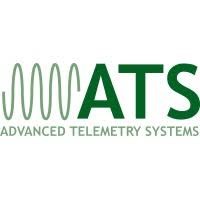
|
ATS (Advanced Telemetry Systems) |
| Advanced Telemetry Systems have been a part of wildlife radio telemetry for over 35 years. They provide researchers and managers in ecology and biology with animal tracking and monitoring products of the highest quality and reliability. Their commitment to fish and wildlife biotelemetry dates back to 1963, when researchers at the University of Minnesota first began exploring electronic methods of tracking animals in the wild. This commitment continued with the founding of Advanced Telemetry Systems in 1981. Their most recent expansion, completed in 2004, more than doubled the size of our facility. ATS is the industry's full-line supplier to the world's researching biologists and environmentalists. Tracking products (transmitters, GPS, receivers,etc…) and Tracking systems (GPS Systems, manual radio tracking, remote unattended stations, etc..) are designed either for fish and marine mammals than for reptiles, avian or insects. | |
|
|
THELMA BIOTEL |
| The history of Thelma Biotel goes back to the early years of the 1970s, when the Norwegian researchers Holand, Mohus, and Balchen started developing acoustic transmitters for fish, and equipment for fisheries field studies. The technology and methods were continuously developed at the independent research company, SINTEF, and the Norwegian University of Science and Technology (NTNU). It was finally commercialised under the name Thelma in 2002. In 2008 Thelma Biotel spun off as a separate company, with a sole focus on further development of wireless monitoring in the submerged environment. Thelma Biotel’s equipment and services are developed by technology researchers and highly skilled craftsmen in close cooperation with the top actors at the biology research scene. At the end of 2019, during the International Conference on Fish Telemetry in Arendal Norway, a set of open, acoustic transmit protocols was officially announced and handed over to the research community. As an answer to the request from The European Tracking Network, Thelma Biotel, together with the companies Sonotronics and Lotek, developed robust and energy efficient transmit protocols for open protocol used in the aquatic research community. | |
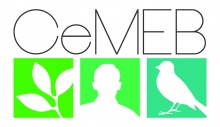
|
LABEX CEMEB |
| The Mediterranean Centre for Environment and Biodiversity Laboratory of Excellence (CeMEB LabEx) is a federation of ten research units in the Montpellier area. Research focuses on the dynamics and functioning of biodiversity and ecosystems in a context of marked environmental change, notably due to human activities. An important objective is to use scenarios to anticipate both the biological consequences of global change, and anticipate the evolution of ecosystem services and human societies. The research agenda is addressed at all types of ecosystems (from the equator to the poles, terrestrial and marine) and living organisms (from micro-organisms to large mammals). A particular focus is ‘wild’ biodiversity, in the form of numerous long-term research field programs. Approaches combine observation and modelling, especially experimentation. They draw upon high-level tools, such as the Montpellier European Ecotron, the experimental facility at Puéchabon, shared genomics, ecology, chemistry, bio- and eco-computing platforms, and experimental greenhouses and plots. | |
|
|
REGION OCCITANIE |
| The Occitanie / Pyrenees-Mediterranean region covers 13 departments and has 4454 municipalities. The region is rich in varied landscapes and climates, including two national parks (Cévennes National Park, Pyrenees National Park), 8 regional nature parks, a natural marine park, more than 220 km of Mediterranean coastline and 2 International Dark Sky Reserves (Pic du Midi de Bigorre, 1st French Dark Sky Reserve and Cévennes National Park). Between the Garonne and the Rhone rivers, a large area unfolds, bordered to the north by the foothills of the Massif Central and to the south by the Pyrenees and the Mediterranean. In 27 centuries of history, this southern European space, made of multiple and subtle complementarities, has seen peoples with different cultures and spiritualities mix and mingle. | |

|
BIOLOGGING SOLUTIONS |
| Biologging Solutions Inc. provides a series of solutions for "logging laws" of animals and environments based on biologging techniques. The company was founded by biologging researcher in Japan. Their experience starts from our B.S. M.S., and Ph.D. research mainly conducted at Biosphere Info. Lab. at Kyoto University. Combining Japanese manufacture technologies and their research experiences gained through long practical uses in field experiments, they develop and produce various kind of electronic tags (data logger). It is also their specialty to create a custom-made electronic tags and software for researcher's need. | |
|
|
LOTEK |
| Founded in 1984, Lotek is a world leader in the design and manufacture of fish and wildlife monitoring systems. Their innovative and internationally recognized radio, acoustic, archival and satellite monitoring solutions allow researchers to track animals, birds and fish of almost any size, in almost any environment. They are committed to providing innovative solutions for a sustainable future. Leading researchers around the world rely on Lotek telemetry equipment and expertise. They are partners in fish and wildlife research being conducted in more than 100 countries – on every continent and in every ocean. | |

|
INTELLIBIO |
| Our company designs advanced analytical and behavioral test devices for in-vivo studies in the field of neuroscience, with a high level of performance, reproducible and reliable, in strict compliance with the ethics of laboratory work. We extend our range of custom products by collaborating with numerous manufacturing and distribution partners to equip you at the best price with standard behavioral analysis devices and other equipment and accessories for researchers and animal researchers: surgical tools, small animal equipment, RFID identification chip, ... |
